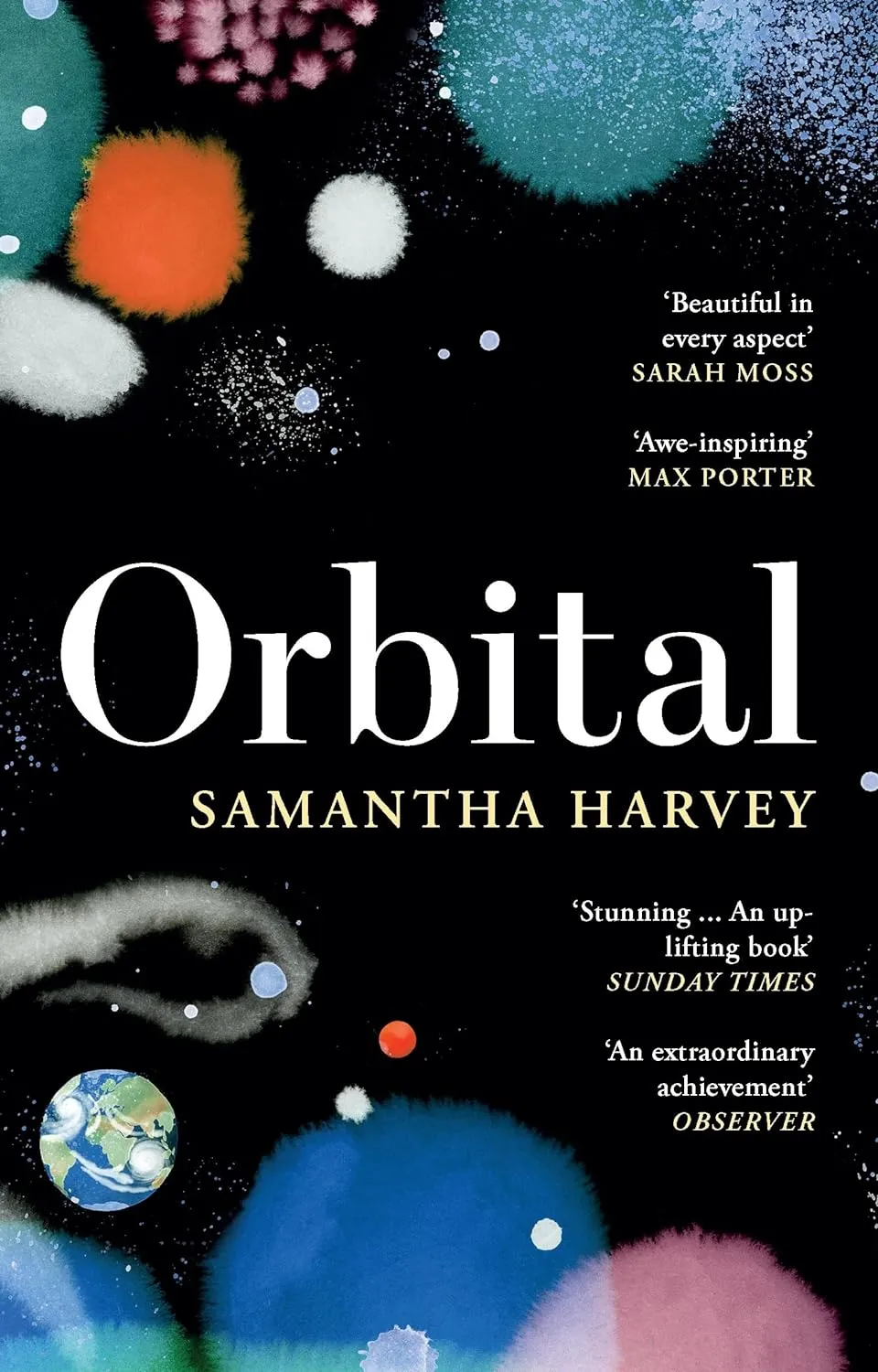A dizzying, stark, haunting reflection on humanity’s hubris from outer space.

Samantha Harvey| Orbital| Jonthan Cape: £9.99
Reviewed by Paul Knowles and Edith Powell
Orbital by English writer Samantha Harvey is a lyrical reflection on what makes us human: our hopes, beliefs and fragilities. The narrative follows six astronauts from across the globe (Russia, Japan, Ireland, America and Italy) and their daily lives on the international space station. We follow as the characters complete scientific experiments, exploring the impacts of space exploration and inhabitation on humans. Harvey goes to great lengths to capture the physical toil of weightlessness and the mental fatigue of the astronauts. As they orbit earth sixteen times a day, each character slowly loses their grasp of earthly concepts such as time, distance, vastness and the mundanity of existence.
The space station and the astronauts act as a microcosm for civilisation, allowing Harvey to offer reflections on humanity’s vast range of beauty and ugliness. Whilst humans stand on the precipice of outer space inhabitation, transfixed by the idea of colonising other planets, Harvey offers us an elegy on the beauty and majesty of earth. We are guided by her lyrical descriptions of towering mountain ranges, meandering rivers, vast oceans and drifting ice sheets that make up the continents we inhabit. Like moths to a flame, the astronauts throughout the narrative are drawn to the viewing deck, and we can sense Harvey’s desperate plea for the reader to consider earth’s miraculous capacity to maintain life. The natural beauty and splendour of the planet is contrasted with the marks and scars left on the surface by humanity. The astronauts recognise humanity from outer space through destruction and pollution: tracing cities by the light pollution they generate, identifying India by smog clouds, and recognising Siberia by the glow of forest fires. Human demise thus acts as the main catalyst of the novel’s action as the astronauts are tasked with tracking a growing typhoon building into a swirling mass of destruction before barrelling towards the Philippines. Harvey’s narrative suggests the force and the intensity of the typhoon has been impacted by anthropogenic climate change.
Harvey interposes aspects of the astronauts’ lives on earth throughout their daily routines on the space station. A Russian astronaut reflects on his relationship with his wife, from their first meeting to feeling like they could now easily walk away from each other. An Irish astronaut is bewildered by their partner’s need to be anchored to the landscape through pursuing a rural life of farm management. They are startled by the pictures of their partner’s daily life on the farm and are struggling to fathom the look of contentment on their face while they are in the countryside. They come to the slow realisation that while their partner would never leave earth, they would leave earth in a heartbeat to travel to Mars, even if there was no hope of returning home. The most poignant moments in the novel come from the Japanese astronaut receiving news of her mother’s death. She recollects on her mother’s life, being a survivor of Hiroshima, her experience in a loveless marriage, years of backbreaking agricultural labour all so her daughter can achieve her impossible dream. These memories offer moments of tenderness and human warmth that the novel desperately needs, so it escapes becoming a passionless observation of humans working in space.
Harvey’s novel is a dizzying kaleidoscope of big philosophies, anxieties on environmental destruction, the influence of our personal and family histories, and the small intimate moments of grief that define us all, whilst being set in space. In truth, it is the perfect novel for 2024. A novel that asks whether humanity’s unwavering faith in technology sacrifices the wonder and beauty of the natural resources of our own planet. A novel that reaches into the heart of what makes us human. A novel that centres our humanity in our capacity for love and our ability to forge friendships and relationships with others. A novel that also asks if it is our more sinister longings that make us human; our uncontrollable need to become faster and stronger, our need for mastery and control over nature and space. It’s a novel that allows for multiple readings and interpretations. That is Harvey’s gift, she has the ability to elicit emotional responses from us in the deftness and lyricism of her descriptions of earth, space, and human life.
Orbital offers readers a reflection on humankinds’ hubris. We look to the sky and the stars for miracles and our species’ future when we should realise, our haphazard existence on this planet is the miracle we are looking for in space, yet we destroy the planet that sustains us.
Reviewed by Paul Knowles and Edith Powell
